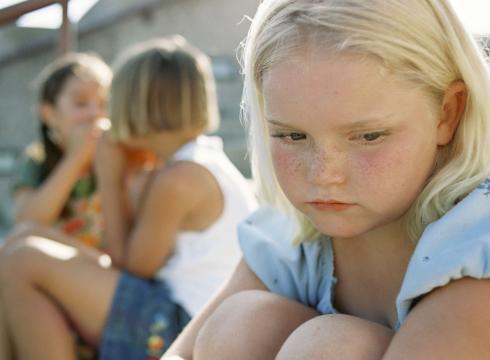Is my child depressed? How to support a child with mental illness.
Some say silence is golden. Not me. Silence nearly killed me. Silence is the very thing that saw me develop severe mental illness.
I'm 19 years old, I study nursing, I live out of home, independent. Perfectly normal, at face value. However, I spend each and every day fighting for my life – fighting to recover from Depression, Bulimia Nervosa, Post Traumatic Stress Disorder and Self Harm. But these are just labels. Medical terms that don't reflect the trauma and hurt that underlies the symptoms, nor the pain and heartache that goes into recovering from them.
Internalizing
I spent years, throughout my school life, internalizing my feelings from sexual abuse, bullying and psychological trauma. Turning them inwards, often masking them by over eating and trying to maintain my facade. I was too scared to explain how much I was hurting because I had no exposure to anyone with an open mind about mental illness – I felt like no one around me would understand.
It's proven that when intercepted early, there is a greater chance of recovery from mental illness. This is why it is so vital that parents are aware of the signs of a child who is suffering and how to support them.
The most important thing to remember is to look beyond unusual behavior in children – depression doesn't look like depression in kids. Children may withdraw, act out, become irritable or unpredictable. Don't take your teenager's sudden 'attitude problem' at face value.
Be open to conversation
Kids or adolescents need to know that what they're feeling is valid and real. It's important that they understand that mental illness is as real and as serious as cancer or diabetes and it's important that they seek treatment for it. Have regular conversations with your kids about feelings, emotions & pain. It's so important to express these emotions rather than suppress them.
Eradicate shame – always make sure mental illness isn't associated with negative connotations. Statements like "she's insane" or "what a nutcase" at someone elses abnormal behavior implies to the child that anything out of the ordinary that they may be experiencing is a sign of 'craziness' and will make them less likely to express what's happening.
Being aware of your behavior around your child is also important. Introducing body shame such as diets into a household sets a child up for an unhealthy understanding of food and exercise. A child needs to understand the concept of a healthy diet – that is, how to nourish their bodies properly, understanding that some foods are okay to have occasionally and exercise shouldn't be driven by weight loss.
Be aware of the signs
Younger people will often portray their struggles through other aspects of their lives. This may include:
- A decline in school performance
- Recurring problems within friendship groups and relationships
- Lack of appetite or over eating
- Outbursts, rage or unexplained anger
- Reduced interest in extracurricular activities
- Signs of self harm – bruising, cuts, hair loss, burns.
- Bullying others
- Interrupted sleep patterns or extreme sleepiness
Access support
If your child's behavior is causing you concern, it's important to access support as soon as possible. The best place to start is your local GP or family health clinic. Through these services you should be able to access a mental health nurse who will be able to undertake an assessment and provide you with appropriate support contacts.
Remember your child may not feel comfortable opening up to a stranger with you in the room – don't be offended. The professionals will ensure that you're as involved as possible in the process, without breaking confidentiality. Sometimes it's much easier talking to a professional, as they have no emotional connection to the situation.
Be involved
While it's important that your child talk with their professionals one on one, it's also important that you spend and equal amount of time in the appointments with them. It's important to learn how to support your child, what language to use around them and how far to push the situation. It also provides a safe environment for your child to open up about concerns they may have that they might not have been comfortable talking to you about.
Never be afraid to ask questions – if you're unsure of something then you need to look for answers. This is particularly important if you have questions about why the professionals are taking a certain approach.
If your child is prescribed medication, ensure that the prescription is made my a qualified psychiatrist (not a GP) and is justified. Unfortunately over prescription of psychotropic medication in adolescents is far too common. Medication should only be used in conjunction with therapy and other methods of treatment. Medication may ease the symptoms but it does not take away the problem.
Most importantly…
Look after yourself
Caring for someone with a mental illness is exhausting, psychically, mentally and emotionally. It's important that you seek support for yourself and ensure that you're able to process your own emotions and feelings about the situation. Feeling frustrated and angry is normal and healthy – you need a safe environment to express and process these feelings.
Have you had experience supporting a child with mental illness? What was most helpful when you were seeking support? If you're concerned about your child – what questions do you have about the treatment process?
- Navigating Pregnancy as a Teen: Tips for a Healthy and Happy Journey - July 23, 2025
- What Does It Take to Start the Best Possible Relationship With Your New Dog? - July 23, 2025
- You Deserve To Take Care Of Yourself And Your Needs - July 20, 2025



